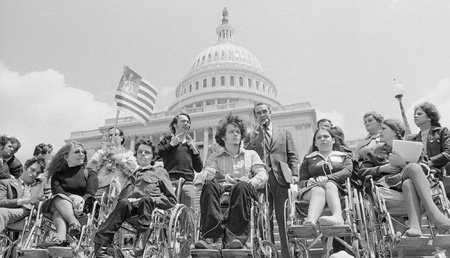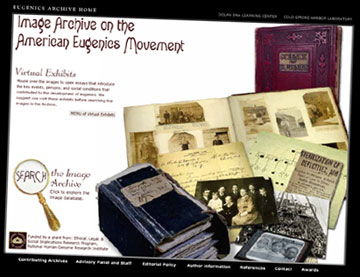

Definition and Models of Disability
A group of disabled Americans lobbies at the Capitol in 1972 for many of the rights and public accommodations that are now standard. The disability rights movement, born in the United States in the 1960s and 1970s, has been slower to take hold in the rest of the world. (Bettman/Corbis/AP Images)
See Ch. 1. The Roles of Disability in Society, and Ch. 2. Social Classifications of and Reactions to Disability.
The introduction and part I cover the history of disability studies; counting, defining, measuring, and theorizing disability. [Also available in print]
Disability: The Basics is an engaging and accessible introduction to disability which explores the broad historical, social, environmental, economic and legal factors which affect the experiences of those living with an impairment or illness in contemporary society.
Each of the 60 essays in Keywords for Disability Studies focuses on a distinct critical concept, including “ethics,” “medicalization,” “performance,” “reproduction,” “identity,” and “stigma,” among others.
The report contains chapters on health, rehabilitation, assistance and support, enabling environments, education, and employment. The voices of people with disabilities open each chapter, setting the scene for what follows. Within the chapters, case studies show how many countries have succeeded in promoting good practices. The diverse challenges faced in low, middle and high income settings are differentiated wherever possible.
See the Introduction and the essays in Part I: Uses and Contests. These essays focus on the functions of disability and the concept of disability as contested terrain.
Discusses the background against which the Americans with Disabilities Act was formed.
Covering the entirety of US history from pre-1492 to the present, A Disability History of the United States is the first book to place the experiences of people with disabilities at the center of the American narrative.
In What We Have Done: An Oral History of the Disability Rights Movement, Fred Pelka takes that slogan at face value. He presents the voices of disability rights activists who, in the period from 1950 to 1990, transformed how society views people with disabilities, and recounts how the various streams of the movement came together to push through the Americans with Disabilities Act of 1990, the most sweeping civil rights legislation since passage of the Civil Rights Act of 1964.
Chapter 8: "The Institution Yet to Come": Analyzing Incarceration through a Disability Lens by Liat Ben-Moshe
The field of disability history continues to evolve rapidly. In this collection, Susan Burch and Michael Rembis present nineteen essays that integrate critical analysis of gender, race, historical context, and other factors to enrich and challenge the traditional modes of interpretation still dominating the field.
Readers will discover how different societies have responded to people with disability throughout history, how life has changed for people with intellectual disability and their families over the centuries, and how key historical figures and events sparked social change and shaped our modern understanding of intellectual disability.
Bending Over Backwards reexamines issues concerning the relationship between disability and normality in the light of postmodern theory and political activism. Davis takes up homosexuality, the Americans with Disabilities Act, the legal system, the history of science and medicine, eugenics, and genetics.
"From the seventeenth century to the early years of the twentieth, the population of Martha's Vineyard manifested an extremely high rate of profound hereditary deafness. In stark contrast to the experience of most Deaf people in our own society, the Vineyarders who were born Deaf were so thoroughly integrated into the daily life of the community that they were not seen--and did not see themselves--as handicapped or as a group apart."
Emerging from the internationally recognised Theorising Normalcy and the Mundane conference series, the chapters in this book offer wide-ranging critiques of that most pervasive of ideas, 'normal'. In particular, they explore the precarious positions we are presented with and, more often than not, forced into by 'normal', and its operating system, 'normalcy' (Davis, 2010).
Disability Rhetoric is the first book to view rhetorical theory and history through the lens of disability studies. Traditionally, the body has been seen as, at best, a rhetorical distraction; at worst, those whose bodies do not conform to a narrow range of norms are disqualified from speaking. Yet, Dolmage argues that communication has always been obsessed with the meaning of the body and that bodily difference is always highly rhetorical.



Award-winning 18-minute documentary video, which captures the drama and emotions of the historic civil rights demonstration of people with disabilities in 1977, resulting in the signing of the 504 Regulations, the first Federal Civil Rights Law protecting people with disabilities. Includes contemporary news footage and news interviews with participants and demonstation leaders. Available in open caption, audio descriptive and standard formats.
Dateline meets children with severe Tourette's and follows their journey to a summer camp where they find they're not alone.
This video segment profiles Ed Roberts, the man who is called the father of the independent living (IL) movement.
Four decades ago, Judith Heumann helped to lead a groundbreaking protest called the Section 504 sit-in -- in which disabled-rights activists occupied a federal building for almost a month, demanding greater accessibility for all. In this personal, inspiring talk, Heumann tells the stories behind the protest -- and reminds us that, 40 years on, there's still work left to do.
Born with a genetic visual impairment that has no correction or cure, Susan Robinson is legally blind (or partially sighted, as she prefers it) and entitled to a label she hates: "disabled." In this funny and personal talk, she digs at our hidden biases by explaining five ways she flips expectations of disability upside down.